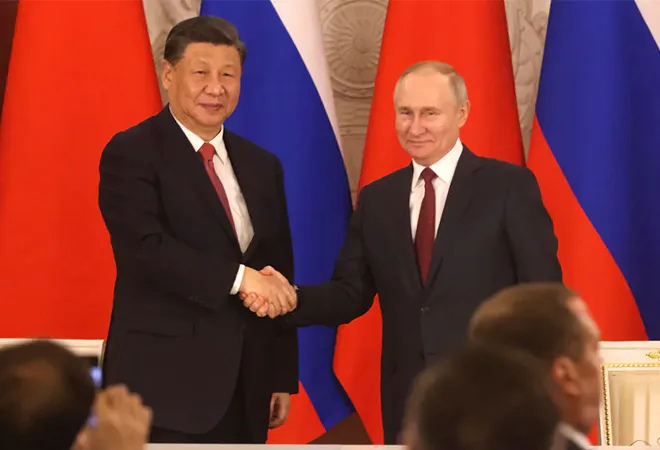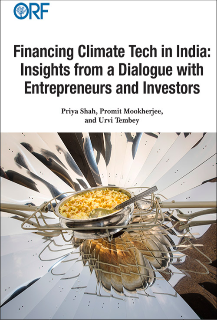 This is the fifty ninth part in the series
This is the fifty ninth part in the series The China Chronicles.
Read all the articles here.
The Russia-China partnership has so far defied easy categorisation. Two formerly adversarial countries now enjoy a steady yet flexible relationship. Their growing engagement since the events in Ukraine in 2014 has revolved around the
sale of military equipment, Russian
oil sales to China, and increased
Chinese financing for Russia amidst Western sanctions. Moscow and Beijing
generally agree on the shortcomings of an international order dominated by the United States and its allies. Their relationship has caused a lot of concern, especially for the United States’ as was evident in its latest
National Security Strategy (NSS). However, there are certain underlying tensions within the relationship that place constraints on their bilateral ties. These relate to each side’s national interests as well as their engagement with the international order. It must be said that the two sides have been adept at managing these tensions over the years, but they may affect the trajectory of the relationship in the long run.
The driver of these anxieties is the imbalance in the relationship. While both countries are significant actors in the international arena, Russia’s anxieties in particular stem from demographics as well as economics. China’s population and GDP are almost ten times those of Russia. Russia’s exports to China are primarily raw materials and hydrocarbons. Many analyses point to the tensions inherent to this buyer-seller relationship. As Russia becomes increasingly dependent on China for investments and as a market, the latter’s power to negotiate favourable deals will only increase. Thus, Russia will remain wary of overdependence on one country, particularly one with whom many of its interests overlap. Russia’s tendency to balance various interests and preserve its strategic autonomy while expanding its influence will come into play. This would increase the likelihood of some degree of rapprochement with Europe, especially given President Trump’s recent actions that have pushed Europe and Russia closer together. Whereas since China’s priority is its economic development, Western countries are more attractive partners, even if Beijing does benefit from Russian oil.
China’s pragmatic approach to this imbalance has allowed the relationship to continue without seriously threatening the basis of their ties. Much depends on how it continues to deal with these pressures.
In Ukraine, an area Russia considers being integral to its security, China refrained from directly criticizing or supporting Russia’s actions. It abstained in the Security Council vote that would have declared the Crimean referendum illegal, while issuing instructions to its domestic media outlets to refrain from connecting the issue to its own separatist problems. While many Western countries responded to the violation of Ukrainian sovereignty by imposing sanctions, China criticized their usage but ultimately complied with them.
Similarly, in the South China Sea, an area which lies within China’s ‘sphere of interest’ but does not concern Russia directly, the latter has pursued its own interests. China’s calibrated actions in the region are unlikely to invite the level of backlash Russia’s actions in Crimea did and the two have conducted joint exercises in the region. But as Russia seeks to expand its footprint in the Pacific, evident in its modernisation of its Pacific fleet, it may be drawn into the region. It has engaged in its natural tendency to balance various interests without giving the appearance of capitulating to any one power by engaging with Vietnam. Vietnam is wary of Chinese activities in the region owing to its boundaries being threatened, but Russia has cooperated with Hanoi militarily as well as in the hydrocarbon sector.
The pair’s actions in Central Asia, where both desire significant stakes, will be important in the coming years. Russia sees it an area that is key to its expanding influence. Although most Central Asian countries recognize their historic ties with Russia and the latter’s economic power and security interests in the region, some have been less than enthusiastic about participating in Russia-led projects such as the Eurasian Economic Union (EAEU) and the Collective Security Treaty Organisation (CSTO). Russia’s introduction of stricter immigration controls for the region has also proven to be a sore spot. China instead prefers to offer economic growth as an incentive. The region is key for China’s ‘Go West’ policy as well as a flagship project, the Belt and Road Initiative (BRI), to showcase its influence in Asia, but its benefits for the region are limited as Chinese firms prefer to employ Chinese workers. This form of engagement does not challenge Russia’s role as a potential security guarantor in Central and West Asia.
However, China’s foray into the security sphere may be inescapable, and combined with its expansion into a historically important geographical area for Russia, this may affect the relationship in the long run.
These tendencies—China’s pragmatism and its recognition of the importance of the West, and Russia’s balancing act and its aversion to outside encroachment in its ‘sphere of influence’—will only exacerbate the imbalance. Russia’s geopolitical weight has certain benefits for China, and China is emerging as a key economic partner for Russia. But their relentless pursuit of their national interests and their respective relations with the West might ultimately be more important than their relationship with each other, especially Russia’s ties with Europe and China’s ties with both Europe and America.
Links between the governments and leaders may be close, but Russia’s general affinity for Europe is greater. Further antagonizing the West is in neither Moscow nor Beijing’s interest.
Chinese policymakers have expressed apprehension about Russia’s unpredictability, following its actions in Crimea and later Syria. The convergence between China and Russia is over their opposition to the US-led system, but they do not yet define what their roles are to be in their conception of international order. American policies under President Trump may be pushing them closer together at the moment, but this may be more out of expedience than a desire to build any sort of formal alliance. In any case, their relationship is a product of the current international context, so it is reasonable to assume a change in context could lead the two to re-evaluate their relations.
The views expressed above belong to the author(s). ORF research and analyses now available on Telegram! Click here to access our curated content — blogs, longforms and interviews.



 This is the fifty ninth part in the series The China Chronicles.
Read all the articles
This is the fifty ninth part in the series The China Chronicles.
Read all the articles  PREV
PREV


